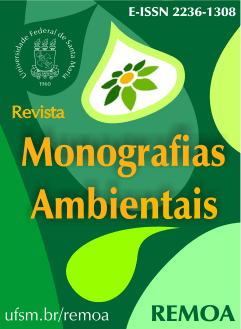Brasil: o acesso universal ao saneamento básico
DOI:
https://doi.org/10.5902/2236130814518Palabras clave:
Saneamento básico, Doenças, Poder públicoResumen
O saneamento é um direito fundamental e deve ser oferecido pelo Poder Público, porém atualmente este serviço não esta sendo prestado adequadamente. O acesso regular a água potável e segura tem causado preocupação, principalmente em países em desenvolvimento e, mais enfaticamente em áreas periurbanas, que abrigam a população socialmente excluída. A falta ou a precariedade do acesso água representa situação de risco que propicia aumento da incidência de doenças infecciosas agudas e da prevalência de doenças crônicas. O caminho para reverter esse cenário e a implementação integrada de politicas públicas de gestão, que envolvam ações conjuntas e ajustadas nos setores de desenvolvimento urbano, habitação, saneamento e saúde e que visem à promoção e a proteção da saúde da população local e ao enfrentamento da complexidade de fatores que evidenciam sua vulnerabilidade. O seguinte trabalho teve como objetivo analisar a atual situação de acesso ao saneamento básico no Brasil, os problemas que a falta deste recurso pode gerar, bem como o dever do Estado mediante a esta situação.
Descargas
Citas
ANA: Agência nacional das águas. Disponível em: http://www.ana.gov.br/. Acesso em 8 de jun. de 2014.
ALOCHIO, Luiz Henrique Antunes. Direito do saneamento: introdução à lei de diretrizes nacionais de saneamento básico (Lei Federal n. 11.445/2007. Campinas: Millennium Editora, 2007, p. 66. Ibid, p. 12.
BRASIL. Ministério das Cidades. Saneamento ambiental 5. Brasília, DF, 2004.
DRENAGEM urbana. Pesquisa nacional de saneamento básico. Rio de Janeiro: IBGE, 2008. Disponível em: http://www.ibge.gov.br Acesso em: 3 jun. 2014.
HESPANHOL, Ivanildo. Água e saneamento básico: uma visão realista. In: REBOUÇAS, Aldo da Cunha; BRAGA, Benedito e TUNDISI, José Galizia (Orgs.). Águas doces no Brasil: capital ecológico, uso e conservação. 2. ed. São Paulo: Escrituras Editora, 2002, p. 251.
Indicadores de morbidade e fatores de risco. Disponível em: http://www.datasus.gov.br. Acesso em: 8 jun. 2014
MENDONÇA, Mário Jorge Cardoso de; MOTTA, Ronaldo Seroa da. Texto para discussão n° 1081. Saúde e saneamento no Brasil. Rio de Janeiro: IPEA, 2005, p. 1.
Ministério do meio ambiente. Disponível em: http://www.mma.gov.br/. Acesso em: 7 jun. 2014.
Morbidades hospitalares 2007 em Mato Grosso do Sul. Disponível em: http://www.ibge.gov.br. Acesso em: 4 jun. 2014.
NOTÍCIAS. Crise da água perpetua e alarga desigualdades: falta de água e saneamento não só é reflexo do foço entre ricos e pobres como alarga essa diferença, diz representante do PNUD Brasil. Disponível em: http://www.pnud.org.br. Acesso em: 10 jul. 2008.
Não há saúde sem saneamento. Disponível em: <http://www.esgotoevida.org.br> Acesso em: 06 jun. 2014.
RELATÓRIO de desenvolvimento humano 2007/2008. Combater as alterações climáticas: Solidariedade humana num mundo dividido, p. 257. Disponível em: http://www.pnud.org.br. Acesso em: 3 jun. 2014.
Saneamento básico: essencial para saúde, economia e produção. Disponível em: http://www.espacoecologiconoar.com.br. Acesso em: 06 jun. 2014.
TUCCI, Carlos E. M. Gestão da água no Brasil. Brasília : UNESCO, 2001, p. 129.
UNESCO: Organização das nações unidas. Disponível em: http://www.unesco.org/new/pt/brasilia/. Acesso em: 04 de jun. de 2014.
Descargas
Publicado
Cómo citar
Número
Sección
Licencia
Ethical guidelines for journal publication
The REMOA is committed to ensuring ethics in publication and quality of articles.
Conformance to standards of ethical behavior is therefore expected of all parties involved: Authors, Editors, Reviewers, and the Publisher.
In particular,
Authors: Authors should present an objective discussion of the significance of research work as well as sufficient detail and references to permit others to replicate the experiments. Fraudulent or knowingly inaccurate statements constitute unethical behavior and are unacceptable. Review articles should also be objective, comprehensive, and accurate accounts of the state of the art. The authors should ensure that their work is entirely original works, and if the work and/or words of others have been used, this has been appropriately acknowledged. Plagiarism in all its forms constitutes unethical publishing behavior and is unacceptable. Submitting the same manuscript to more than one journal concurrently constitutes unethical publishing behavior and is unacceptable. Authors should not submit articles describing essentially the same research to more than one journal. The corresponding author should ensure that there is a full consensus of all co-authors in approving the final version of the paper and its submission for publication.
Editors: Editors should evaluate manuscripts exclusively on the basis of their academic merit. An editor must not use unpublished information in the editor's own research without the express written consent of the author. Editors should take reasonable responsive measures when ethical complaints have been presented concerning a submitted manuscript or published paper.
Reviewers: Any manuscripts received for review must be treated as confidential documents. Privileged information or ideas obtained through peer review must be kept confidential and not used for personal advantage. Reviews should be conducted objectively, and observations should be formulated clearly with supporting arguments, so that authors can use them for improving the paper. Any selected referee who feels unqualified to review the research reported in a manuscript or knows that its prompt review will be impossible should notify the editor and excuse himself from the review process. Reviewers should not consider manuscripts in which they have conflicts of interest resulting from competitive, collaborative, or other relationships or connections with any of the authors, companies, or institutions connected to the papers.






